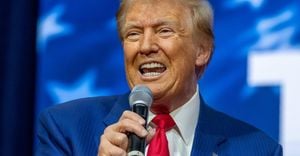Donald Trump has emerged victorious. While sociologists had predicted a closer race, the outcome was hardly a surprise. The conclusion of one of the most intense electoral campaigns in recent memory has arrived. Though the final vote tally is still pending, especially in key swing states, it’s already clear Trump is on his way back to the White House. This marks a historic achievement: Trump will become only the second person in U.S. history to secure two non-consecutive presidential terms. Even his fiercest critics must acknowledge the magnitude of this feat, particularly considering the legal battles and judicial challenges he has faced.
Leading up to the election, pre-election polls showed surprising dead heat between the two main contenders — Kamala Harris and Donald Trump. Both candidates enjoyed roughly equal support from voters nationally and in the swing states, which often have unpredictable outcomes shaped by demographic and historical factors. Predicting clear winners based solely on polling data proved challenging, and the eventual results defied many expectations.
Some analysts pointed out the Democratic party's long-standing advantage nationwide, where, even if the candidate loses, they usually score significantly higher total votes due to the peculiarities of the Electoral College system. This time, Trump is reportedly winning both the national popular vote and the Electoral College, with confirmation of his victory expected soon. The significance here cannot be overstated.
This election doesn’t feel as surprising as Trump’s first victory against Hillary Clinton back in 2016, where he was the underdog according to liberal sentiments. Instead, the landslide victory seen now reflects the swift momentum gained by Trump and his running mate, J.D. Vance. They quickly secured the necessary 270 Electoral College votes. Republican campaign teams, though confident, expressed disbelief at how quickly the results came through. With polls closing, they didn't expect clarity on the victor so early.
Sociologists now face the question of whether their analytical tools failed to capture the true support for Trump. Why did they underestimate the enthusiasm for him again? Several explanations emerge, including the familiar occurrence of “shyness” among Trump's supporters. Many who participated in polls didn't openly reveal their backing for the former president, perhaps fearing backlash or social repercussions.
Commentators are drawing up predictions of how Trump's second term, should he take office, will lead to continuous surprises and unpredictability. Trump's reputation for impulsive behavior, erratic decision-making, and swift changes to political priorities is often highlighted by major media outlets and his former allies. During his first term, he consistently found himself at odds with established norms, and his business background hugely influenced his political approach.
Yet, proposing the idea of endless chaos under Trump overlooks substantial truths. A Harris victory would probably have yielded surprising outcomes during her presidency. History suggests people may look back on the Harris administration and note significant shifts away from the anticipated Democratic agenda. Wasn’t the narrative around maintaining stability post-Trump already flawed?
It’s worth considering the consensus that's built around U.S. foreign policy concerning China. Although distinct strategies may exist, both parties agree about the geostrategic rivalry with Beijing. Hence, the upcoming shifts under Trump may be more about nuance rather than revolutionary policy alterations. The same applies to European relations, where fears are already rising about Trump's potential return.
With the international community readying for transformation under Trump, his presidency might present fewer drastic surprises compared to the hypotheticals under Harris. Trump's unpredictability feels less alarming now. Conversely, were Harris to lead, the unforeseen twists would perhaps elicit greater shock due to her lack of governance experience.
This election doesn't merely signify Trump's return but hints at significant changes within American political culture. Over the last several years, Trump has altered the Republican Party's foundation and image, reshaping it to be nearly unrecognizable. His second victory may prompt similar shifts within the Democratic Party, altering the broader political dynamics.
Trump's first term was perceived as anomalous — branded by many as the “Trump aberration”. After Biden's win, the narrative pivoted toward recovery and stability. The subsequent elections positioned Democrats as defenders of the status quo. Clearly, the electoral results starkly disagreed with those narratives. Trump not only clinched more than the requisite 270 votes but is also on course to win the popular vote as well, marking his strongest performance in his three presidential campaigns.
Another concerning aspect for Democrats is their diminishing influence within the Senate following the election, losing their majority there too, along with facing strong Republican dominance over the House of Representatives. This stark electoral reality prompts the Democratic Party to reassess its strategies and messaging. The electorate's voice seems to suggest deep-rooted issues within the party's prior narratives. Simply returning to previous stances won’t suffice; they need to engage deeply and honestly with what went wrong during their campaigns.
There's no doubt Trump’s political return opens up numerous questions about future governance and the way U.S. democracy has been shaped. The unpredictability associated with any administration leads to constant speculation, but there's no denying the dawn of potentially new, invigorated political times. What does the future hold? Only time will tell, and the actions taken following the election's aftermath will be foundational to shaping America's political narrative for years to come.



